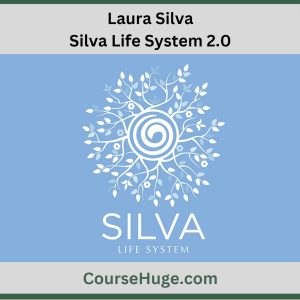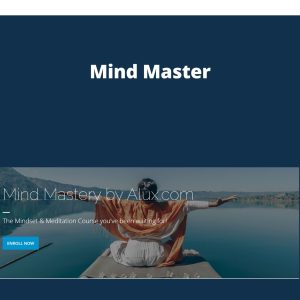NeuroWisdom 101: Brain Science for Stress-Free Living
$267.00 Original price was: $267.00.$21.00Current price is: $21.00.
Mark Waldman NeuroWisdom 101 Course [Instant Download]

What is NeuroWisdom 101?
NeuroWisdom 101 is Mark Waldman’s 8-week audio course teaching science-based brain training techniques for stress reduction and happiness.
The program features practical neuroscience exercises that help shift consciousness and access enlightened states regularly. It delivers simple micro-exercises developed from 40,000 scientific studies, blending neuropsychology, positive psychology, mindfulness, and cognitive therapy into immediately applicable techniques.
Each exercise is designed to create lasting neural changes with minimal daily time investment.
📚 PROOF OF COURSE



What you’ll learn in NeuroWisdom 101 Course:
NeuroWisdom 101 teaches practical neuroscience techniques you can apply immediately in your daily life. Here’s what you’ll learn:
- Brain rewiring techniques to turn negative thinking into lasting optimism
- Stress reduction methods proven by science to fight the main causes of illness
- Mindfulness practices that take just minutes a day but make lasting brain changes
- Consciousness shifting exercises to reach deeper awareness and creativity
- Communication strategies to improve relationships with family, friends, and coworkers
- Self-regulation tools to stay calm and clear when facing any problem
This complete program helps both beginners and experts. By the end, you’ll know how to control your brain, mind, and life using brain science techniques that really work.
NeuroWisdom 101 Course Curriculum:
✅ Module 1: Foundations of Consciousness (CD-1, Lessons 1-8)
This first module introduces the fundamental concepts of consciousness, exploring its spectrum and the limitations of everyday awareness. Students learn about the “10-10 Rule” and how our perceptions of reality are constructed by the brain.
Key lessons include “Super Learning” which establishes the learning framework for the course, and “Reality is Not Real” which challenges students’ perceptions of objective reality. The module concludes with “Learning How to Play,” introducing the importance of playfulness in expanding consciousness.
As students progress through this module, they move from theoretical concepts to developing an understanding of how their own consciousness operates and how it can be shifted into more productive states.
✅ Module 2: Awareness Practices & Emotional Management (CD-2, Lessons 9-21)
Building on the foundation of consciousness, this module introduces practical techniques for deepening awareness and managing emotions. Students learn methods to transcend inner speech, engage in creative daydreaming, and connect with their inner wisdom.
Standout lessons include “Deepening Awareness with a Bell,” a meditation technique using sound, and “Eliminate Worry with Math,” which offers a practical approach to quantifying and reducing anxiety. “Three Words That End Conflicts” provides a simple but powerful communication strategy.
The progression in this module moves from basic awareness exercises to more sophisticated emotional regulation techniques, culminating in optimism as a healing practice.
✅ Module 3: Stress Reduction & Enlightenment Concepts (CD-3, Lessons 22-31)
This module focuses on stress management and introduces deeper concepts of enlightenment. Students learn unconventional approaches to dealing with negative thoughts and experiences, including how to use pleasant memories as stress antidotes.
The module features provocatively titled lessons like “Squeeze the Crap Out of Your Brain” and “Don’t Get Rid of Your Crap,” teaching counterintuitive approaches to handling negative thoughts. The three-part series on enlightenment presents this concept in accessible terms.
As students progress through this module, they move from specific stress-reduction techniques to broader philosophical perspectives on enlightenment and wisdom.
✅ Module 4: Brain Enhancement & Habit Formation (CD-4, Lessons 32-47)
This extensive module covers techniques for enhancing brain function, developing beneficial habits, and exploring various meditation practices. Students learn how pleasure, novelty, and gratitude can be leveraged to build a better brain.
Key lessons include “Dopamine Dessert,” which teaches how to consciously create positive neurochemical experiences, and contrasting meditation approaches in “Meditate Less, Get More” and “Movement Meditation.” The module also covers habit change with “Sabotage Bad Habits.”
The progression moves from individual brain-enhancing practices to creating systems for ongoing growth through strength and accomplishment boards.
✅ Module 5: Purpose, Resilience & Integration (CD-5, Lessons 48-58)
The final module focuses on discovering life purpose, building resilience, and integrating all previous learning. Students learn to accept weaknesses while developing skills that align with their values and purpose.
Powerful lessons include “Discover Your Purpose in Life,” “Interrupt Painful Memories,” and “How to Be Happy Whenever You Want.” The course concludes with “Embrace Your Crap and Be Free,” bringing the journey full circle.
Throughout this module, students are guided to integrate their learning into a coherent life philosophy and practical approach to well-being, culminating in the ability to create happiness and contribute positively to others through “Pay It Forward.”
Who is Mark Waldman?

Mark Waldman is a neuroscience researcher who focuses on spirituality, communication, and brain optimization. He started coaching in 1987 under Bruno Bettelheim at the Southern California Psychoanalytic Institute.
As an Associate Fellow at the University of Pennsylvania, Mark used brain-scan research with Andrew Newberg to improve cognitive performance. Oprah chose their book “How God Changes Your Brain” as a “Must Read” for 2012.
Mark has written 14 books and his research appears in science journals worldwide. His work has been featured in Time Magazine, Washington Post, New York Times, and Forbes. His TEDx Talk has over 100,000 views.
He created the first NeuroLeadership course for Loyola Marymount University’s Executive MBA program. He teaches brain-enhancing strategies to organizations like the UCLA Center for Neurobiology of Stress and Pepperdine School of Psychology.
Be the first to review “NeuroWisdom 101: Brain Science for Stress-Free Living” Cancel reply
Related products
Meditation
Best 100 Collection
Meditation
Health & Wellness
Meditation
Meditation












Reviews
There are no reviews yet.